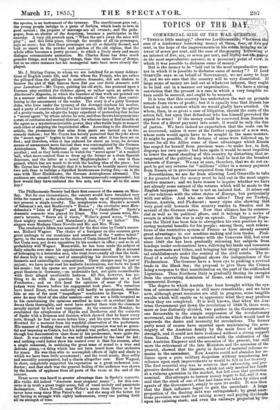The Philharmonic Society had their first concert of the seasonon
Mon- -day. Ent for one circumstance, the concert would have furnished very :little for remark ; as the selection, -though made np of :masterpieces, did not preterit a single novelty. The symphonies were, Haydn's seventh of Salomon's set, and Beethoven's " Eroica " ; the overtures were Men- " Isles of Fingal" and Mozart's -" Zauberflote." Spohr's dramatic concerto was played :by Ernst. The vocal pieces were, Mo- zart' terzetto, "Soave sia il yenta," Weber's Arend scene, "Ocean, thou mighty monster," and Marschner's duet, "0 my father." The singers were Madame Clara Novello and Mr. and Mrs. Weiss. The conductor's baton was assumed for the first time by Costa's Emcees- nor, Richard Wagner. The choice" of a foreigner on this occasion gave great umbrage to our musicians and amateurs of 'the "native talent" party, in the same manner as the choice-of Coda himself bad done before ; 'but Costa soon put down opposition by his conduct in office; and so in all probability will Wagner. Meanwhile, he has been made the subject of daily attacks ever since his appointment was-announced. He is accused cf belonging to a heterodox sect, who treat irreverently all that the faith- ful deem holy in music; and of exemplifying his doctrines by his own fantastie and unintelligible compositions. These charges may be just or =just; we have never read his a3sthetic lucubration; nor have we heard hismwric.: but his operas are now performed With applause in all the great theatres in Germany,—an undeniable fact, not quite reconcileable with their alleged unutterable badness. All this, however, has no- thing to do with the question in hand, his character as a chef d'orchestre ; and on this head the opinions of some of the best judges were known before his engagement took place. We ourselves have heard Ernst, whose authority will hardly be questioned, describe him as one of the most " magnifigne" conductors in Europe. What- ever he may think of the older masters—and we are a little sceptical as to his entertaining the opinions ascribed to him—it is evident that he knows them thoroughly, and must have studied them with the closeness xisually incited by love and veneration. At the concert on Monday, he conducted the symphonies of Haydn and Beethoven and the concerto of Spahr with a firmness and decision which showed that he knew every 'note, though he had no score before him; and his eyes were thus never diverted for a moment from his watchful observation of the performers. His manner of beating time and indicating expression was not so grace- ful and imposing as Costa's, but his aplomb was perfect, and his gestures, though less demonstrative than those of his predecessor, were quite dis- tinct. It was evident that he was well understood by the band he led ; and nothing could better show his control over it than his success, after a single rehearsal, in subduing the great mass of sound to a true and delicate piano,—a thing which has not been heard from that orchestra for years. He was thus able to accomplish effects of light and shade to which we have been little accustomed; and the vocal music, thus softly and smoothly accompanied, had a charm altogether new. Herr Wagner, in short, completely supported his reputation as a great orchestral con- ductor; and that such was the general feeling of the audience was shown by the bursts of applause from all parts of the room at the end of the concert.
Ernst never was heard to greater advantage than in Spolies concerto.
His violin did indeed "discourse most eloquent music " ; for this con- certo is in truth a great tragic scene, full of vocal melody and passionate declamation. Clara Novell° sang Webees scene from Oberon as it has never been sung since Miss Paton's day : and she sang all the better for not having to struggle with eighty instruments, every one putting forth all its strength of tone.


























 Previous page
Previous page